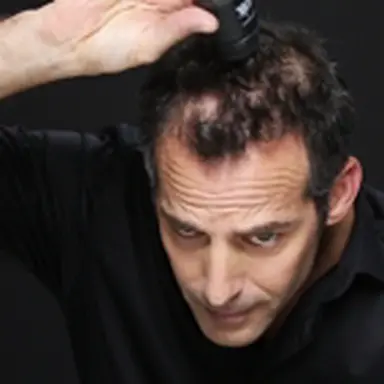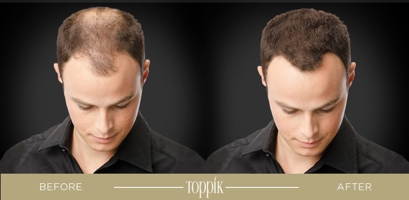
Whether men or women, young or older people, everyone can be affected by hair loss. Alopecia may be punctual or, on the contrary, irreversible. As the Toppik redensifying powders intended to fill in sparse areas are arriving in France, the issue of the malaise related to hair loss is put in the spotlight.
French people and their hair
A study conducted by polling organization Yougov on a sample of 1,000 people between September 22 and 25, 2017, shows that to 83% French people, their hair represents a weapon of seduction.
In addition, it is related to the idea of wellness: the study reveals that to 75% of the people surveyed, having beautiful hair as they wake up in the morning helps them start the day off right. What about those who suffer from alopecia? 63% of the panel considers hair loss affects self-confidence and attractiveness to the opposite sex. Indeed, 16% of respondents have already cancelled a date due to their hair condition, which they felt was not satisfactory enough.
Olivier Sachon, the brand’s Marketing Director, adds that as far as this issue is concerned, we are not all equal.
‘Women have the hardest time with it, because from a social standpoint, they are not accepted if they are bald. Young men are also racked by malaise when they become victims of alopecia, simply because baldness issues are directly associated with older individuals,’
he emphasizes.
Why do we lose our hair?
There are many reasons for it:
• Heredity
• A pregnancy leading to hormone disturbances, and then hair loss
• Lack of sleep
• Nicotine addiction
• Unhealthy lifestyle
• Extreme hair treatments (colorations, knotting, straightening, use of heating devices) which gradually weaken the hair
Except in case of hereditary hair loss, most of these disorders are punctual. Still, it is recommended to go see a specialist as soon as the first signs appear to prevent any more significant loss.
Hair is the founding pillar of our identity
Psychologist Sarah Goldberg explains that
‘if today, 63% French people consider hair loss leads to poorer self-confidence, it can be said this sensation is quite legitimate. Why is that so? Because our identity basically depends on our self-esteem. The stronger you are, the easier it is for you to put up with your daily life.’
The people who suffer from hair loss have a different, sometimes harsher perception of themselves.
‘They are out of step with reality because they no longer recognize themselves. The people who have this type of concerns have the impression they have no control over their bodies anymore. If you cannot rebuild yourself or change your identity foundations, you can fall into isolation,’
she comments.
She explains that the individuals that suffer from alopecia say their private lives are impacted.
‘It is a sensitive issue for one French person out of two. It is true that when we see someone with hair issues, we rarely feel like mentioning them. We prefer to act as if it were just business as usual, because we are all aware of the fact that it is a delicate pathology to deal with,’
she adds.
 Our relationship with our hair is much deeper than we can imagine. Our hair is also a representation of what we are deep inside.
‘We change its colour, size, and shape. These modifications mark transitions and changes we all experience at some point in our lives,’
she concludes.
Our relationship with our hair is much deeper than we can imagine. Our hair is also a representation of what we are deep inside.
‘We change its colour, size, and shape. These modifications mark transitions and changes we all experience at some point in our lives,’
she concludes.
Every year, three million products related to hair loss are sold in France. The phenomenon concerns a large part of the population. Although it does not fix the problem at the source, the cosmetics industry offers a punctual, but very interesting solution to the people affected, with products like redensifying powders.
JS













